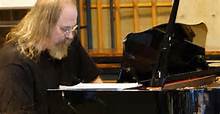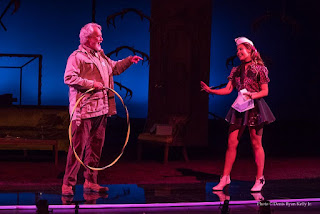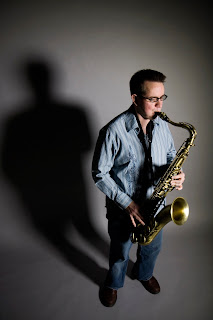Posts
Showing posts from September, 2016
Montrose Trio, a new group made up of veteran musicians, helps two groups open their seasons
- Get link
- X
- Other Apps

Out of one of the most accomplished string quartets of the 20th century came the newly minted Montrose Trio, which opened the seasons of two venerable Indianapolis music organizations Wednesday night. Montrose Trio: Martin Beaver, Jon Kimura Parker, and Clive Greensmith. After 44 years, the originally all-Japanese Tokyo String Quartet disbanded in 2013. The next year, two of its last members — Martin Beaver and Clive Greensmith — decided with the Tokyo's frequent collaborator on piano, Jon Kimura Parker, to form a new piano trio. To bring the group to Indianapolis so early in its history had something to do with Beaver's status as a laureate in the 1990 International Violin Competition of Indianapolis. So the competition, which for many years has also been a concert presenter, teamed up with Ensemble Music Society, whose history is rich in exposing local audiences to the best small ensembles in the world, to get both their seasons off to an excellent start. The seco...
Henry Kramer opens Premiere Series of participant concerts in quest for APA's Classical Fellowship
- Get link
- X
- Other Apps

Henry Kramer played Mozart, Haydn, Ligeti, Chopin, and Ravel impressively. An unannounced switch of program order in Henry Kramer's recital Sunday afternoon resulted in thunderous applause after the first movement of Chopin's Piano Sonata No. 2, op. 35. Perhaps some people thought they had just heard Ravel's "Ondine," which was originally due to follow the opening piece, Haydn's Sonata in E major, Hob. XVI:31. I'm not one of those death-to-those-who-applaud-between-movements purists, though I prefer not to. But it wasn't necessarily out-of-place for the Sonata in B-flat minor's "Grave. Doppio movimento" to get such an ovation at the Indiana History Center, considering the command that Kramer displayed. Admirable was the steady balance of left and right hands, which share material fiercely in dubious battle to the very end. (And by "dubious" I mean "of uncertain outcome," as John Milton used it in that phrase, ...
Everything looks rosy as ISO celebrates 100th birthday of its home, 200th of its state
- Get link
- X
- Other Apps

The feeling of a community resting on solid foundations energized the atmosphere Sunday evening as the Indianapolis Symphony Orchestra presented its Opening Night Gala concert at Hilbert Circle Theatre. Jack Everly as he appears on ISO website. It was Jack Everly's show. A conductor from Richmond who is used to occupying the spotlight, which he does affably and without a touch of the grandiose, presenting himself to the ISO's blended audience and several dignitaries whose presence was acknowledged by CEO Gary Ginstling from the stage. A recently signed contract, with terms reached early and not against a play/don't-play deadline, shows ISO's musicians a way out of the shadows of a difficult contract that forced them to lose professional status with a tightened schedule and smaller paychecks. Things are looking up. Everly knows how to shape pops programs. His gala choices were mixed, but with popular appeal guaranteed. Guest stars included some local connectio...
Don't know much about history, or swordfighting? No matter, as Indiana Repertory Theatre opens with "The Three Musketeers"
- Get link
- X
- Other Apps

Stage combat has a way of distracting me, but only momentarily. When it is well done, as it is in Indiana A "Three Musketeers" swordfight: You'll put the nagging question aside. Repertory Theatre's new production of "The Three Musketeers," the question keeps popping up: "How do they do that?" In magic shows, that's part of the entertainment, the wonder of the genre. Watching a drama with fight episodes is a different matter. If the question keeps nagging at you, you're of course removing yourself from the dramatic illusion you should be embedded within. It's funny that technical wizardry, which may be even more mysterious to the outsider, rarely poses this problem. Consider Ann G. Wrightson's lighting design for this show, the way it seems to mold figures sculpturally. It's lighting that gives extra animation to motion onstage, of which there is plenty. Like the model she cites as inspiration, Rembrandt's "Nig...
Before Peter sang "I've gotta crow": Phoenix Theatre opens season with "Peter and the Starcatcher"
- Get link
- X
- Other Apps

In "Peter and the Starcatcher," there is no call to the audience to assert its belief in fairies as a device for setting up a happy ending. That heart-tugging moment in J.M. Barrie's play becomes, in this prequel to "Peter Pan," an unspoken creed, the foundation of its magical properties. The implied, fresh proposal in Rick Elice's play is to avow a belief in friendship, even such an unlikely one as that between a nameless orphan boy and an aristocratic girl. Phoenix Theatre opened its production of "Peter and the Starcatcher" Thursday night on the Russell Stage. It's an adventure at sea, animated by piratical plotting, exotic destinations and stratagems to reach them, mix-ups of cargo, crews, and captives. All of this bodies forth in an elaborate blend of drama and narrative, some of it involving choral speaking, making the show a fine-tuned ensemble triumph. Bryan Fonseca directs a large cast loaded with familiar Phoenix faces and voic...
Punctuating Beethoven: Michael Schelle's new piano piece sweeps away hints of satire or parody
- Get link
- X
- Other Apps

Here's a novelty: A concert review that starts off with a disquisition on punctuation, and then covers only one of the works performed. But bear with me, because what appears to be throat-clearing turns out to bear directly on what to make of a particular new piece. Michael Schelle, perhaps contemplating Beethoven at the piano. Among the many uses of the comma is to set off words in direct address. Often these are names, but not always ("Comfort ye, my people," for example). Our informal age often trims out commas, nothing worth much tsk-tsking if ambiguity isn't the result. There's no confusion when it comes to a title such as "Happy Birthday Wanda June," the new opera premiered at the Schrott Center for the Arts last weekend in an Indianapolis Opera production. There's only one way to read the title, even though the poignancy of Wanda June's untimely death would be more subtly underlined if the comma were used. The inscription in icing ...
Ravi Coltrane: No second-generation jinx here in saxophonist's return visit to the Jazz Kitchen
- Get link
- X
- Other Apps

Ravi Coltrane played the Jazz Kitchen Wednesday. Since his last Indy Jazz Fest engagement, Ravi Coltrane has crossed the half-century threshold. Time not only heals all wounds, as the adage has it; it also helps put a monumental inheritance in perspective. I have no idea if Coltrane has old wounds in need of healing, but it's a certainty that distance from his father's heyday is useful in revealing his artistry to a public that is in part attracted to both his names. John Coltrane had a fondness for improvising over modes, and Ravi displayed that as well Wednesday in the second set of his quartet gig at the Jazz Kitchen in front of a full house. But the manner (less legato stream-of-consciousness) and the tone are different, particularly when Ravi picks up the soprano saxophone. No one can escape the fresh life John Coltrane brought to the soprano more than 50 years ago. The revelation can be summed up by John's playing of the title song on "My Favorite Things...
Chicago's Lincoln Trio spotlights "Trios from Our Homelands"
- Get link
- X
- Other Apps

'The Lincoln Trio bows toward three heritages. In their latest Cedille recording, "Trios from Our Homelands," members of the Lincoln Trio look across the water to countries central to the heritage of each. They share the advocacy with equanimity through the strength of their performances. The project yields a program consisting of works by Rebecca Clarke (England), Arno Babajanian (Armenia), and Frank Martin (Switzerland), acknowledging the origins, respectively, of cellist David Cunliffe, pianist Marta Aznavoorian, and violinist Desiree Rustrat. Performances are exemplary. I was happiest to make the acquaintance of Clarke's Piano Trio, which dates from 1922. Untouched by the modernism that was then ascendant, the 241/2-minute work makes its most impressive statement in the first movement, Moderato ma appassionato . The respite provided by the second movement seems genuine; and it is most welcome, because the finale, while still gripping, becomes grandiloque...
Indy Jazz Fest double bill: Directors Jazz Orchestra, followed by hometown return of Phil Ranelin
- Get link
- X
- Other Apps

Phil Ranelin is one of few active musicians with a Wes Montgomery connection. To feel welcome, he had some formidable company who've made careers in his hometown. It was enough to make Phil Ranelin a congenial boss of the bandstand during an Indy Jazz Fest showcase Monday night at the Jazz Kitchen . The 77-year-old trombonist, just inducted into the Indianapolis Jazz Hall of Fame, led a set that felt like a homecoming reception. The band personnel is well-known to local jazz fans: Clifford Ratliff, trumpet; Rob Dixon, saxophones; Kevin Anker, piano; Thomas Brinkley, bass; Greg Artry, drums. Long active in Detroit and Los Angeles, Ranelin on Monday night displayed his crisp, explosive trombone style in a comfortable context, focusing on energy and rapport more than precision of ensemble. All the solos were strong in a selection from Ranelin's 2004 "Inspiration" CD. Dixon switched to alto, to follow Ratliff cheerfully in the series; Ranelin was at his asser...
"His Wild Statements": An attempt in song (a blend of an interpretation by Susan Boyle and the Rolling Stones original) to peer into the mind of a Trump loyalist
- Get link
- X
- Other Apps
Eminent visiting guitarist fronts a dynamic quartet at the Jazz Kitchen
- Get link
- X
- Other Apps

Russell Malone was also among many guitarists paying tribute to Wes Montgomery. The Jazz Kitchen and Russell Malone made their mutual admiration society publicly evident early Sunday evening. The nonverbal results were evident throughout the guitarist's first set. David Allee, the club's proprietor, introduced the quartet by saying he'd long wanted to bring Malone to the Jazz Kitchen. And between selections in that initial set, Malone returned the compliment, saying he'd wanted for years to play the Jazz Kitchen. The full house was the beneficiary. The band Malone heads is tight-knit. Formidable in the background and capable of taking attractive turns in the spotlight were bassist Luke Sellick and drummer Willie Jones III. In the second tune, Cedar Walton's "The Rubber Man," an episode of trading eights with the drummer indicated Jones' knack for following a tune's implications rather than just making a splash. This skill, also displayed i...
Guitarists come from near and far to celebrate Wes Montgomery at Indy Jazz Fest
- Get link
- X
- Other Apps

At one of several panel discussions distributed over the course of a long day of music Saturday at IUPUI, Wes Montgomery, the most important jazz guitarist since Charlie Christian, is the 2016 Indy Jazz Fest focus. moderator Kyle Long asked the three musician panelists to identify what they found most distinctive about Wes Montgomery, the innovative jazz guitarist who called Indianapolis home throughout his brief life. The Indy Jazz Fest' s busiest day got under way in a room renamed "The Hub Bub" after an old Indianapolis bar where local jazz history was made. The answers Long received covered several notable aspects of Montgomery's artistry that are still revered nearly 50 years after his death here while in his middle 40s. Bill Lancton praised Montgomery's legacy of relaxed soulfulness. Another fellow guitarist long active here, Steven Weakley, said: "Wes knew how to tell a story." Pianist-bandleader Monika Herzig shared her belief that ...
"Happy Birthday, Wanda June" sings a song all its own, with native son Kurt Vonnegut straddling the here and the hereafter
- Get link
- X
- Other Apps

Something I heard Kurt Vonnegut say long ago on a literary visit to the University of Michigan has stuck with me. I'll have to paraphrase it: He was recalling time he spent at the Iowa Writers Workshop. At the social gatherings at the end of each day, he noticed a difference in gregariousness between the poets and the novelists. The poets were chattering merrily away, while the toilers in the vineyards of prose fiction drew apart individually, musing and fretting. "The novelists were trying to figure out where the next chapter was going," Vonnegut said, while the poets were happy putting the day's work aside. "Poets — crazy people," he added with a slightly disdainful twinkle. Harold Ryan works to impress his future wife Penelope, in her carhop phase. I've sometimes wondered what the playwrights were like, if there were any in attendance at those parties. My guess is that they would be somewhere in between the poets and the novelists — making sma...
Home cooking: Indy Jazz Fest 2016 launches with a party at Indiana Landmarks Center
- Get link
- X
- Other Apps

Just as the bourgeois adopted the lyric-winged piano of Liszt in the court at Weimar for the solitude of his aeried apartment, Harlem chose for its cold-water flat the hot-blues cornet of King Oliver in his cart under the El pillars of the Loop. -- Melvin B. Tolson (1898-1966), from "MU" ("Harlem Gallery") The festival logo, as projected onto the floor of Cook Theater, Indiana Landmarks Center. I open this brief welcome by quoting a stanza from a remarkable African-American poet who flourished in the 1930s. The excerpt reminds us that art always has a home, however much it may transcend it. It grew up someplace, it was nourished there, and the conditions of the life surrounding its gestation and maturation shaped it before it was adopted elsewhere in both venerated and distorted forms. This seems a good thing to remember as the Indy Jazz Fest gets under way, honoring native son Wes Montgomery this year. What poets and bio...
Zach De Pue begins a new phase as he starts 10th season with ISO
- Get link
- X
- Other Apps

Zach De Pue is at a crossroads with bright prospects. Zach De Pue is about to celebrate a round-number anniversary as concertmaster of the Indianapolis Symphony Orchestra , and the start of his 10th season here is a milestone also opening up a new path for him. He announced a change of direction about a year ago, when he began a phased departure from Time for Three , the string trio he founded with fellow students at the Curtis Institute of Music in Philadelphia. "A classically trained garage band" is among the more enduring phrases that describe the ensemble he launched with Nick Kendall, violin, and Ranaan Meyer, double bass. The repertoire is rich in classical-pop mash-ups, and the stylistic range is immense, from baroque to bluegrass. Continuing in residency with the ISO this season, Time for Three Thursday will introduce to the Happy Hour at the Symphony audience its second successor to DePue: Charles Yang. The first, Nikki Choi, put in a season with the group ...
Three weeks into his position as UIndy director of jazz studies, Mark O'Connor introduces himself as player-composer
- Get link
- X
- Other Apps

Mark O'Connor just joined the UIndy faculty. The veneration that Thelonious Monk inspires in jazzmen often takes the form of compositional portraits of the pioneering pianist (1917-1982). To start his recital off Monday night at the University of Indianapolis, Mark O'Connor chose fellow saxophonist Johnny Griffin's "A Monk's Dream." It is an easy, strolling medium-tempo piece with a bit of a shrug in its step, and it provided a fine introduction to the university's new director of jazz studies, as well as something to make his new collaborators comfortable. They had no trouble finding a good comfort level: O'Connor himself seems to be an approachable colleague on and off the bandstand. Plus, they are among Indianapolis' best: pianist Steven Jones, bassist Nick Tucker, and drummer Kenny Phelps. Griffin's number could be described as an Impressionist portrait of Monk, in contrast to Eric Dolphy's "Hat and Beard," an old fav...
Go, go, Donald J. Trump: A snide endorsement of the GOP candidate in a manner that makes a few flaws seem heroic
- Get link
- X
- Other Apps
(And notice that the kazoo solo strikes a blow for the authentic-instruments movement) The text: Donald J. Trump Back before he got well-known for making scenes, He was a humble multimillionaire from Queens In New York, New York, you're either champ or chump; He knew which one he was, did Donald J. Trump: He didn't like to read, which everyone can tell, But he could make a deal just like a-ringing a bell! Go, go, go, Donald, go Go, go, go, Donald, go Go go, go, Donald, go Go go, go, Donald, go Go go, Donald J. Trump. He came into Manhattan with 12 million or so, His dad gave him the knack for making it grow. Deals were just as good as his lawyers said: If you tried to make a fuss they would cut you dead. You're hit hard? Hit back harder, he learned from Roy Cohn -- Then the host of "The Apprentice" came into his own! [cho...